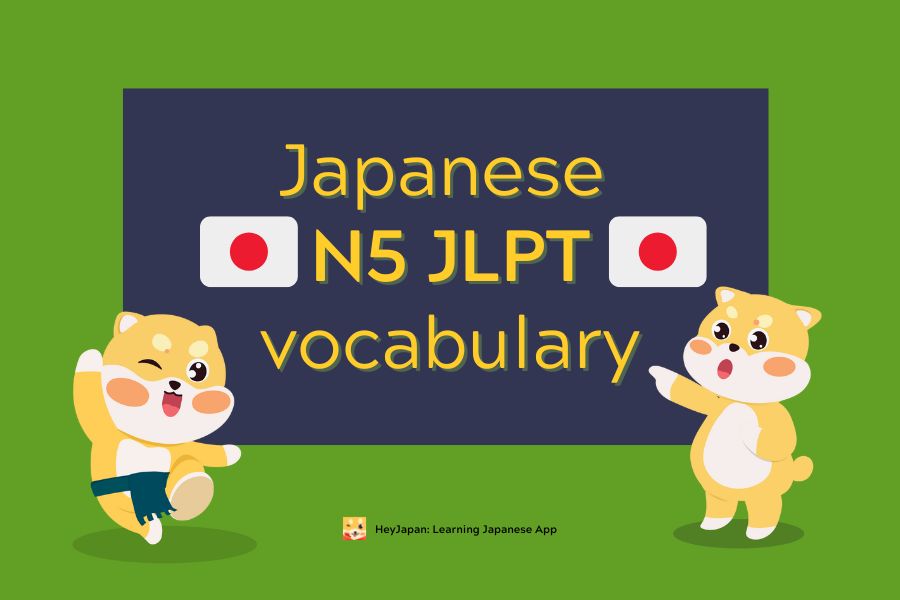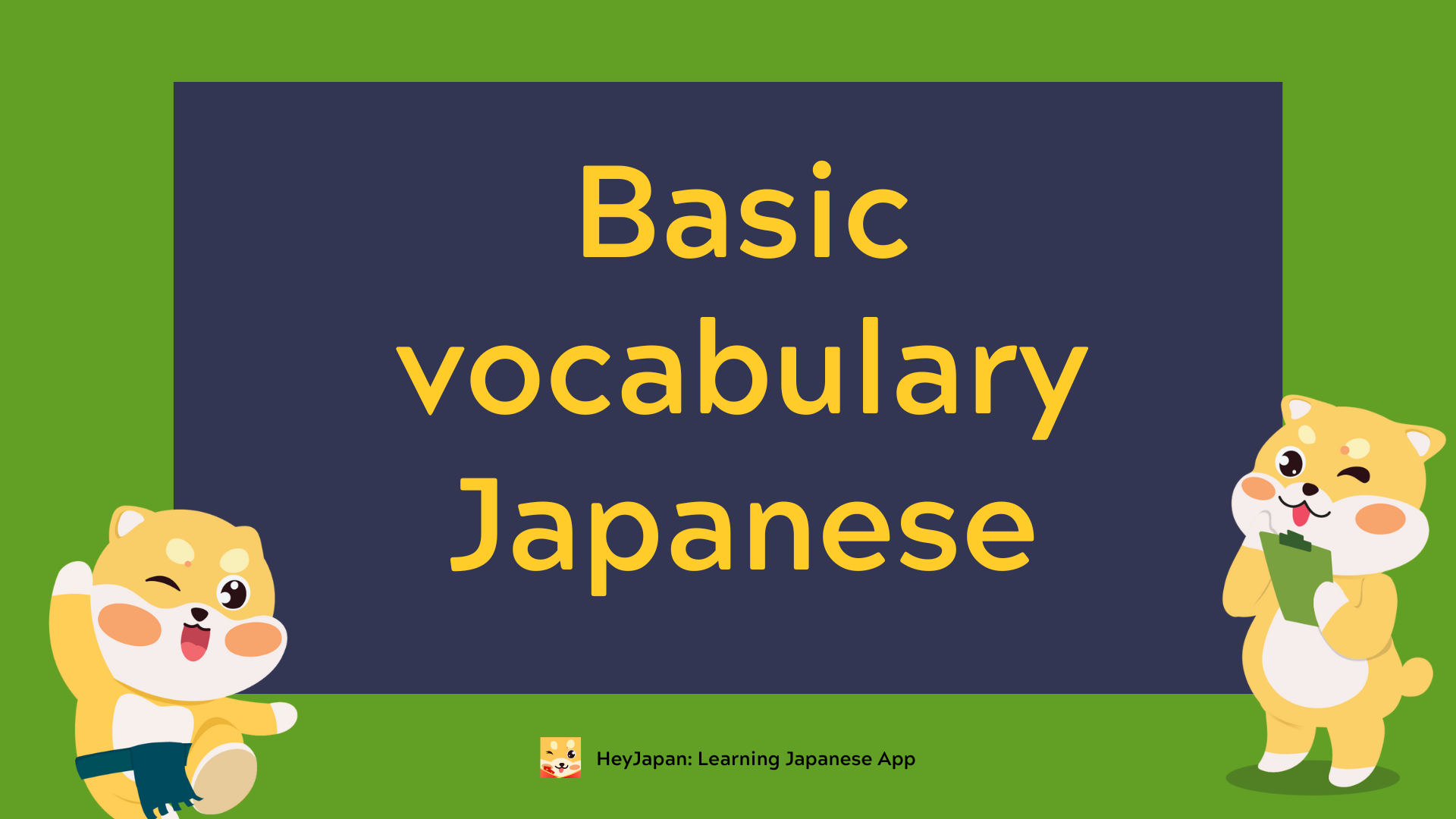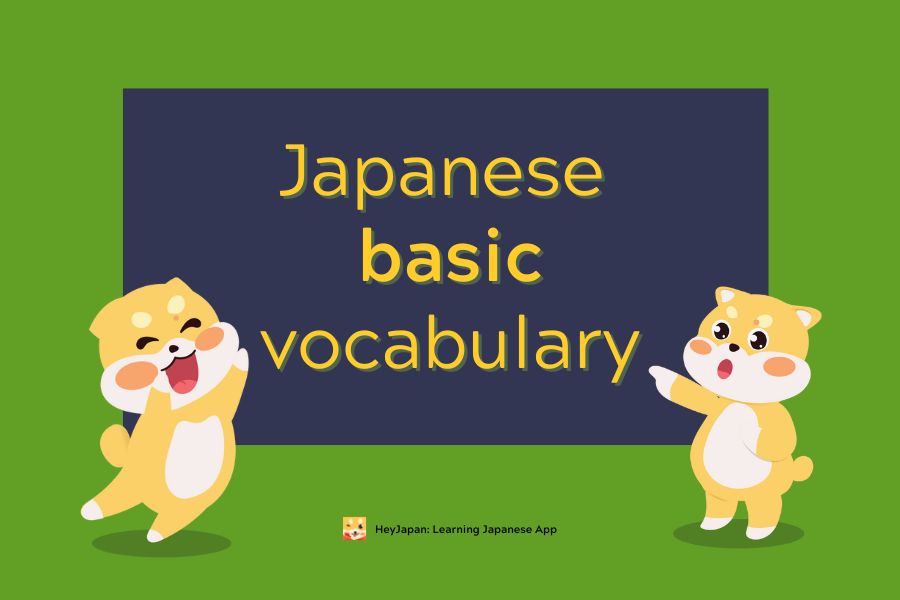- Why Learn Japanese N5 Vocabulary?
- 1. Nouns Vocabulary
- 2. More Nouns Vocabulary
- 3. Verbs Vocabulary
- 4. More Verbs Vocabulary
- 5. Adjectives Vocabulary
- 6. More Adjectives Vocabulary
- 7. Adverbs Vocabulary
- 8. Common Phrases Vocabulary
- 9. Numbers and Time Vocabulary
- 10. Real-Life Scenarios for U.S. Learners
- 11. Tips for Learning Japanese N5 Vocabulary
- FAQ: Japanese N5 Vocabulary
Build your Japanese N5 vocabulary with this comprehensive 2025 guide! Featuring 130 Japanese N5 vocabulary words with pronunciation, this resource covers nouns, verbs, adjectives, adverbs, phrases, and numbers. Ideal for U.S. beginners preparing for the JLPT N5 or learning Japanese for travel, school, or fun.
Why Learn Japanese N5 Vocabulary?
Over 10,000 U.S. learners take the JLPT N5 annually to certify their Japanese skills. Mastering Japanese N5 vocabulary helps you:
-
Understand basic conversations in daily life.
-
Pass the JLPT N5 with confidence.
-
Communicate during travel in Japan.
-
Build a foundation for advanced Japanese studies.
1. Nouns Vocabulary
Essential Japanese N5 vocabulary nouns for beginners:
|
Japanese (Kana) |
Romaji |
Pronunciation |
English Meaning |
Example/Note |
|---|---|---|---|---|
|
猫 |
Neko |
Ne-ko |
Cat |
猫が好きです。(I like cats.) |
|
犬 |
Inu |
I-nu |
Dog |
犬がいます。(I have a dog.) |
|
人 |
Hito |
Hi-to |
Person |
人が多いです。(Many people.) |
|
日 |
Hi |
Hi |
Day, Sun |
日曜日です。(It’s Sunday.) |
|
月 |
Tsuki |
Tsu-ki |
Moon |
月がきれいです。(The moon is pretty.) |
|
水 |
Mizu |
Mi-zu |
Water |
水をください。(Please give me water.) |
|
火 |
Hi |
Hi |
Fire |
火をつける。(Light a fire.) |
|
車 |
Kuruma |
Ku-ru-ma |
Car |
車を買う。(Buy a car.) |
|
電車 |
Densha |
Den-sha |
Train |
電車に乗る。(Ride a train.) |
|
学校 |
Gakkō |
Gak-koo |
School |
学校に行く。(Go to school.) |
|
先生 |
Sensei |
Sen-sei |
Teacher |
先生に聞く。(Ask the teacher.) |
|
学生 |
Gakusei |
Ga-ku-sei |
Student |
学生です。(I’m a student.) |
|
店 |
Mise |
Mi-se |
Shop |
店で買う。(Buy at the shop.) |
|
本 |
Hon |
Hon |
Book |
本を読む。(Read a book.) |
|
手紙 |
Tegami |
Te-ga-mi |
Letter |
手紙を書く。(Write a letter.) |
2. More Nouns Vocabulary
Additional Japanese N5 vocabulary nouns:
|
Japanese (Kana) |
Romaji |
Pronunciation |
English Meaning |
Example/Note |
|---|---|---|---|---|
|
お金 |
Okane |
O-ka-ne |
Money |
お金が必要です。(Need money.) |
|
食べ物 |
Tabemono |
Ta-be-mo-no |
Food |
食べ物を作る。(Make food.) |
|
飲み物 |
Nomimono |
No-mi-mo-no |
Drink |
飲み物を飲む。(Drink a beverage.) |
|
時計 |
Tokei |
To-kei |
Clock, Watch |
時計を見る。(Look at the clock.) |
|
部屋 |
Heya |
He-ya |
Room |
部屋を掃除する。(Clean the room.) |
|
椅子 |
Isu |
I-su |
Chair |
椅子に座る。(Sit on a chair.) |
|
テーブル |
Tēburu |
Te-bu-ru |
Table |
テーブルに本。(Book on the table.) |
|
道 |
Michi |
Mi-chi |
Road, Path |
道を歩く。(Walk the path.) |
|
山 |
Yama |
Ya-ma |
Mountain |
山に登る。(Climb a mountain.) |
|
海 |
Umi |
U-mi |
Sea |
海で泳ぐ。(Swim in the sea.) |
|
空 |
Sora |
So-ra |
Sky |
空が青い。(The sky is blue.) |
|
花 |
Hana |
Ha-na |
Flower |
花を買う。(Buy flowers.) |
|
鳥 |
Tori |
To-ri |
Bird |
鳥が飛ぶ。(Birds fly.) |
|
魚 |
Sakana |
Sa-ka-na |
Fish |
魚を食べる。(Eat fish.) |
|
家 |
Ie |
I-e |
House |
家に帰る。(Return home.) |
3. Verbs Vocabulary
Core Japanese N5 vocabulary verbs for daily use:
|
Japanese (Kana) |
Romaji |
Pronunciation |
English Meaning |
Example/Note |
|---|---|---|---|---|
|
食べる |
Taberu |
Ta-be-ru |
To eat |
ご飯を食べる。(Eat rice.) |
|
飲む |
Nomu |
No-mu |
To drink |
水を飲む。(Drink water.) |
|
行く |
Iku |
I-ku |
To go |
学校に行く。(Go to school.) |
|
来る |
Kuru |
Ku-ru |
To come |
友達が来る。(Friend comes.) |
|
見る |
Miru |
Mi-ru |
To see, look |
テレビを見る。(Watch TV.) |
|
聞く |
Kiku |
Ki-ku |
To ask, listen |
音楽を聞く。(Listen to music.) |
|
話す |
Hanasu |
Ha-na-su |
To speak, talk |
友達と話す。(Talk with friend.) |
|
読む |
Yomu |
Yo-mu |
To read |
本を読む。(Read a book.) |
|
書く |
Kaku |
Ka-ku |
To write |
手紙を書く。(Write a letter.) |
|
買う |
Kau |
Ka-u |
To buy |
本を買う。(Buy a book.) |
|
使う |
Tsukau |
Tsu-ka-u |
To use |
ペンを使う。(Use a pen.) |
|
住む |
Sumu |
Su-mu |
To live |
日本に住む。(Live in Japan.) |
|
寝る |
Neru |
Ne-ru |
To sleep |
早く寝る。(Sleep early.) |
|
起きる |
Okiru |
O-ki-ru |
To wake up |
朝起きる。(Wake up in morning.) |
|
働く |
Hataraku |
Ha-ta-ra-ku |
To work |
会社で働く。(Work at company.) |
4. More Verbs Vocabulary
Additional Japanese N5 vocabulary verbs:
|
Japanese (Kana) |
Romaji |
Pronunciation |
English Meaning |
Example/Note |
|---|---|---|---|---|
|
遊ぶ |
Asobu |
A-so-bu |
To play |
公園で遊ぶ。(Play at park.) |
|
待つ |
Matsu |
Ma-tsu |
To wait |
友達を待つ。(Wait for friend.) |
|
歩く |
Aruku |
A-ru-ku |
To walk |
道を歩く。(Walk the road.) |
|
乗る |
Noru |
No-ru |
To ride |
電車に乗る。(Ride train.) |
|
入る |
Hairu |
Ha-i-ru |
To enter |
部屋に入る。(Enter room.) |
|
出る |
Deru |
De-ru |
To exit |
家を出る。(Leave house.) |
|
作る |
Tsukuru |
Tsu-ku-ru |
To make |
料理を作る。(Make food.) |
|
取る |
Toru |
To-ru |
To take |
本を取る。(Take book.) |
|
渡る |
Wataru |
Wa-ta-ru |
To cross |
道を渡る。(Cross road.) |
|
教える |
Oshieru |
O-shi-e-ru |
To teach |
日本語を教える。(Teach Japanese.) |
|
覚える |
Oboeru |
O-bo-e-ru |
To memorize |
単語を覚える。(Memorize words.) |
|
忘れる |
Wasureru |
Wa-su-re-ru |
To forget |
名前を忘れる。(Forget name.) |
|
持つ |
Motsu |
Mo-tsu |
To hold |
かばんを持つ。(Hold bag.) |
|
借りる |
Kariru |
Ka-ri-ru |
To borrow |
本を借りる。(Borrow book.) |
|
貸す |
Kasu |
Ka-su |
To lend |
お金を貸す。(Lend money.) |
5. Adjectives Vocabulary
Descriptive Japanese N5 vocabulary adjectives:
|
Japanese (Kana) |
Romaji |
Pronunciation |
English Meaning |
Example/Note |
|---|---|---|---|---|
|
大きい |
Ōkii |
Oo-ki-i |
Big, large |
大きい家。(Big house.) |
|
小さい |
Chiisai |
Chi-i-sai |
Small, little |
小さい猫。(Small cat.) |
|
新しい |
Atarashii |
A-ta-ra-shi-i |
New |
新しい本。(New book.) |
|
古い |
Furui |
Fu-ru-i |
Old (things) |
古い車。(Old car.) |
|
長い |
Nagai |
Na-ga-i |
Long |
長い道。(Long road.) |
|
短い |
Mijikai |
Mi-ji-ka-i |
Short |
短い髪。(Short hair.) |
|
高い |
Takai |
Ta-ka-i |
Expensive, high |
高い店。(Expensive shop.) |
|
安い |
Yasui |
Ya-su-i |
Cheap |
安い本。(Cheap book.) |
|
暑い |
Atsui |
A-tsu-i |
Hot (weather) |
暑い日。(Hot day.) |
|
寒い |
Samui |
Sa-mu-i |
Cold (weather) |
寒い朝。(Cold morning.) |
|
熱い |
Atsui |
A-tsu-i |
Hot (things) |
熱いお茶。(Hot tea.) |
|
冷たい |
Tsumetai |
Tsu-me-ta-i |
Cold (things) |
冷たい水。(Cold water.) |
|
広い |
Hiroi |
Hi-ro-i |
Wide, spacious |
広い部屋。(Spacious room.) |
|
狭い |
Semai |
Se-ma-i |
Narrow |
狭い道。(Narrow road.) |
|
楽しい |
Tanoshii |
Ta-no-shi-i |
Fun, enjoyable |
楽しい映画。(Fun movie.) |
6. More Adjectives Vocabulary
Additional Japanese N5 vocabulary adjectives:
|
Japanese (Kana) |
Romaji |
Pronunciation |
English Meaning |
Example/Note |
|---|---|---|---|---|
|
面白い |
Omoshiroi |
O-mo-shi-ro-i |
Interesting, funny |
面白い本。(Interesting book.) |
|
つまらない |
Tsumaranai |
Tsu-ma-ra-na-i |
Boring |
つまらない映画。(Boring movie.) |
|
優しい |
Yasashii |
Ya-sa-shi-i |
Kind, gentle |
優しい人。(Kind person.) |
|
難しい |
Muzukashii |
Mu-zu-ka-shi-i |
Difficult |
難しい問題。(Difficult problem.) |
|
簡単 |
Kantan |
Kan-tan |
Easy, simple |
簡単なテスト。(Easy test.) |
|
早い |
Hayai |
Ha-ya-i |
Fast, early |
早い電車。(Fast train.) |
|
遅い |
Osoi |
O-so-i |
Slow, late |
遅いバス。(Late bus.) |
|
明るい |
Akarui |
A-ka-ru-i |
Bright, cheerful |
明るい部屋。(Bright room.) |
|
暗い |
Kurai |
Ku-ra-i |
Dark, gloomy |
暗い夜。(Dark night.) |
|
強い |
Tsuyoi |
Tsu-yo-i |
Strong |
強い人。(Strong person.) |
|
弱い |
Yowai |
Yo-wa-i |
Weak |
弱いチーム。(Weak team.) |
|
重い |
Omoi |
O-mo-i |
Heavy |
重いかばん。(Heavy bag.) |
|
軽い |
Karui |
Ka-ru-i |
Light (weight) |
軽い本。(Light book.) |
|
おいしい |
Oishii |
O-i-shi-i |
Delicious |
おいしいご飯。(Delicious rice.) |
|
きれい |
Kirei |
Ki-re-i |
Pretty, clean |
きれいな花。(Pretty flower.) |
7. Adverbs Vocabulary
Common Japanese N5 vocabulary adverbs:
|
Japanese (Kana) |
Romaji |
Pronunciation |
English Meaning |
Example/Note |
|---|---|---|---|---|
|
とても |
Totemo |
To-te-mo |
Very |
とても面白い。(Very interesting.) |
|
あまり |
Amari |
A-ma-ri |
Not very (with negative) |
あまり高くない。(Not very expensive.) |
|
すごく |
Sugoku |
Su-go-ku |
Extremely, very |
すごく楽しい。(Extremely fun.) |
|
少し |
Sukoshi |
Su-ko-shi |
A little, a few |
少し食べる。(Eat a little.) |
|
たくさん |
Takusan |
Ta-ku-san |
A lot, many |
たくさん本。(Many books.) |
|
早く |
Hayaku |
Ha-ya-ku |
Quickly, early |
早く走る。(Run quickly.) |
|
遅く |
Osoku |
O-so-ku |
Slowly, late |
遅く寝る。(Sleep late.) |
|
いつも |
Itsumo |
It-su-mo |
Always |
いつも勉強する。(Always study.) |
|
たまに |
Tamani |
Ta-ma-ni |
Occasionally |
たまに遊ぶ。(Play occasionally.) |
|
時々 |
Tokidoki |
To-ki-do-ki |
Sometimes |
時々見る。(Sometimes watch.) |
|
よく |
Yoku |
Yo-ku |
Often, well |
よく読む。(Read often.) |
|
全然 |
Zenzen |
Zen-zen |
Not at all (with negative) |
全然わからない。(Don’t understand at all.) |
|
必ず |
Kanarazu |
Ka-na-ra-zu |
Always, without fail |
必ず来る。(Always come.) |
|
すぐ |
Sugu |
Su-gu |
Immediately, soon |
すぐ行く。(Go immediately.) |
|
もう |
Mō |
Moo |
Already, anymore |
もう食べた。(Already ate.) |
8. Common Phrases Vocabulary
Useful Japanese N5 vocabulary phrases:
|
Japanese (Kana) |
Romaji |
Pronunciation |
English Meaning |
Example/Note |
|---|---|---|---|---|
|
こんにちは |
Konnichiwa |
Kon-ni-chi-wa |
Hello |
こんにちは!(Hello!) |
|
ありがとう |
Arigatō |
A-ri-ga-too |
Thank you |
ありがとう!(Thank you!) |
|
すみません |
Sumimasen |
Su-mi-ma-sen |
Excuse me, sorry |
すみません、道は?(Excuse me, the way?) |
|
おねがいします |
Onegaishimasu |
O-ne-gai-shi-ma-su |
Please |
おねがいします!(Please!) |
|
わかりました |
Wakarimashita |
Wa-ka-ri-ma-shi-ta |
I understand |
わかりました!(I understand!) |
|
だいじょうぶ |
Daijōbu |
Dai-joo-bu |
Okay, alright |
だいじょうぶです。(It’s okay.) |
|
はい |
Hai |
Hai |
Yes |
はい、そうです。(Yes, that’s right.) |
|
いいえ |
Iie |
I-i-e |
No |
いいえ、違います。(No, it’s different.) |
|
おはよう |
Ohayō |
O-ha-yoo |
Good morning |
おはよう!(Good morning!) |
|
こんばんは |
Konbanwa |
Kon-ban-wa |
Good evening |
こんばんは!(Good evening!) |
9. Numbers and Time Vocabulary
Basic Japanese N5 vocabulary for numbers and time:
|
Japanese (Kana) |
Romaji |
Pronunciation |
English Meaning |
Example/Note |
|---|---|---|---|---|
|
一 |
Ichi |
I-chi |
One |
一冊の本。(One book.) |
|
二 |
Ni |
Ni |
Two |
二人の友達。(Two friends.) |
|
三 |
San |
San |
Three |
三時です。(Three o’clock.) |
|
四 |
Shi/Yon |
Shi/Yon |
Four |
四匹の猫。(Four cats.) |
|
五 |
Go |
Go |
Five |
五分。(Five minutes.) |
|
朝 |
Asa |
A-sa |
Morning |
朝に食べる。(Eat in morning.) |
|
昼 |
Hiru |
Hi-ru |
Noon, daytime |
昼に働く。(Work at noon.) |
|
夜 |
Yoru |
Yo-ru |
Night |
夜に寝る。(Sleep at night.) |
|
時間 |
Jikan |
Ji-kan |
Time, hour |
時間がある。(Have time.) |
|
分 |
Fun |
Fun |
Minute |
十分。(Ten minutes.) |
10. Real-Life Scenarios for U.S. Learners
Practice Japanese N5 vocabulary in U.S.-relevant scenarios:
-
At a Japanese restaurant: "I’d like water and rice." – 水とご飯をください。(Mizu to gohan o kudasai.)
-
At a language class: "I’m a student. I read books." – 学生です。本を読みます。(Gakusei desu. Hon o yomimasu.)
-
Traveling in Japan: "Where is the train?" – 電車はどこですか?(Densha wa doko desu ka?)
-
Greeting a teacher: "Good morning, teacher!" – おはよう、先生!(Ohayō, sensei!)
11. Tips for Learning Japanese N5 Vocabulary
To master Japanese N5 vocabulary with pronunciation:
-
Use audio tools: Apps like Jisho or Forvo for native pronunciation.
-
Create flashcards: Anki or Quizlet for memorizing terms.
-
Practice daily: Use apps like Duolingo or LingoDeer.
-
Watch anime: Sazae-san or Chibi Maruko-chan use N5-level words.
-
Join U.S. study groups: Check Meetup for local JLPT prep groups.
-
Speak politely: Use "~ます" forms (e.g., 食べます, tabemasu) for respect.
FAQ: Japanese N5 Vocabulary
1. What is Japanese N5 vocabulary?
It includes ~800-1,000 basic words for JLPT N5, covering nouns, verbs, adjectives, and phrases for beginners.
2. How many words are needed for JLPT N5?
You need ~800-1,000 words, including nouns (猫, neko, cat), verbs (食べる, taberu, to eat), and adjectives (大きい, ōkii, big).
3. Is JLPT N5 hard for U.S. beginners?
N5 is the easiest JLPT level, designed for beginners with basic grammar and vocabulary for daily life.
4. How do I learn Japanese N5 vocabulary with pronunciation?
Use Jisho, watch anime like Sazae-san, and practice with flashcards or audio apps.
5. What are common Japanese N5 words?
Examples: 猫 (Neko, Ne-ko, cat), 食べる (Taberu, Ta-be-ru, to eat), 大きい (Ōkii, Oo-ki-i, big).
6. How can U.S. learners prepare for JLPT N5?
Study 130 words like these, join U.S.-based JLPT prep courses, and use apps like Anki.
7. Why learn Japanese N5 vocabulary for travel?
It helps U.S. travelers communicate in Japan for dining, shopping, and transportation.
Mastering Japanese N5 vocabulary with pronunciation sets U.S. beginners on the path to JLPT N5 success and confident communication in Japan. These 130 terms cover daily life, travel, and study needs. Start learning now! Explore related guides on Japanese caregiver vocabulary or Japanese technical terms.
Related Articles:








